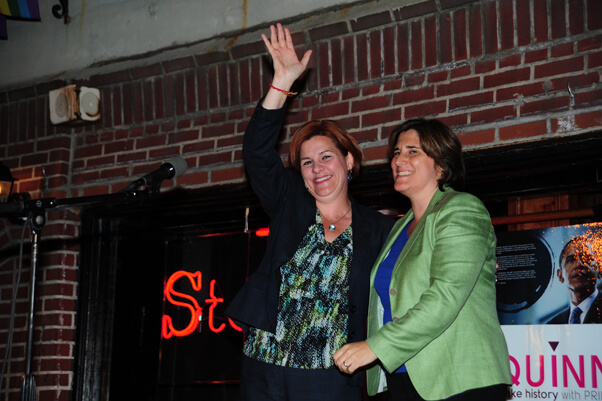A Washington State employer that refused for almost a year to allow employees to enroll their same-sex spouses in its health plan lost its motion to dismiss a discrimination lawsuit pending in federal court.
On September 22, US District Judge Ricardo S. Martinez denied a motion from BNSF Railway Company, which insisted it could not provide the benefits because its plan defined marriage as “between one man and one woman.” BNSF did not extend the benefits until January 1 of this year after it amended its plan through collective bargaining with its employees’ union by adopting a more inclusive marriage definition. That change most likely came in response to the Supreme Court’s ruling last year that struck down the Defense of Marriage Act’s ban on federal recognition of same-sex marriages.
The Washington case illustrates the ongoing challenges in ensuring that marriage equality laws in fact create equal treatment for same-sex spouses. Just days after Martinez’s ruling, the Gay & Lesbian Advocates & Defenders filed a similar claim with the Equal Employment Opportunity Commission on behalf of an employee of a Walmart store in Massachusetts, Jacqueline Cote, who was denied spousal health insurance for her wife, Diana Smithson, for six years. After rejecting their application repeatedly from 2006 through 2012, last year Walmart, reacting to the DOMA ruling, announced it would change its policy effective January 1, 2014.
US district judge refuses BNSF Railway’s motion to dismiss in Washington State litigation
During the period Smithson was refused coverage, however, the couple accumulated more than $100,000 in unpaid medical bills Smithson incurred for conditions including ovarian cancer. The women’s discrimination suit seeks compensation for those expenses.
In a May case in New York, a federal district judge ruled that federal law governing employee benefits plans — the Employee Retirement Income Security Act — did not require St. Joseph’s Medical Center, a Catholic health system in Westchester County, to offer the same-sex spouse of an employee the coverage provided to different-sex spouses. Despite the fact that last year’s DOMA ruling requires the US government to recognize a valid same-sex marriage in New York, absent a federal nondiscrimination employment law, nothing in ERISA compels the hospital system to treat same-sex and different-sex spouses in the same manner, Judge Nelson S. Roman found. And ERISA’s limitations override any nondiscrimination protections New York State law provides.
In the Washington State case, two BNSF Railway employees — Michael Hall and Amie Garrand — brought suit after they were denied the right to enroll their same-sex spouses whom they married after voters there approved marriage equality in the 2012 election. Though their spouses are now covered, the two employees are seeking damages for the period they were denied as well as an order specifying that same-sex spouses living in a state that recognizes their marriage are entitled to equal treatment under employee benefit plans.
Hall and Garrand pointed to nondiscrimination provisions of the federal Equal Pay Act as well as to ERISA. They also claimed protection under Washington State’s Law Against Discrimination, which forbids employment discrimination based on sex and sexual orientation.
Hall added a claim of sex discrimination under Title VII of the 1964 federal Civil Rights Act.
BNSF moved to have all claims dismissed with the argument that federal law does not forbid sexual orientation discrimination and that state law was preempted by ERISA, claims under which are subject to an arbitration provision in that company’s employee benefits plan and so could not be litigated in court.
Martinez agreed that the ERISA claim must be dismissed because of the arbitration provision, but otherwise ruled against BNSF. The judge agreed with the plaintiffs that the denial of coverage could be challenged as sex discrimination.
Even while “acknowledging that it is often difficult to distinguish sex discrimination claims by people identifying as homosexual from those claims based solely on alleged sexual orientation discrimination,” Martinez found that BNSF denied coverage to Hall’s spouse “based solely on the fact that Michael is male… Plaintiff alleges disparate treatment based on his sex, not his sexual orientation, specifically that he (as a male who married a male) was treated differently in comparison to his female coworkers who also married males.”
The judge pointed to a handful of other federal trial court rulings that could be construed to have accepted similar arguments, including a 2009 internal court system administrative finding by Judge Stephen Reinhardt, who sits on the Ninth Circuit Court of Appeals, under whose jurisdiction the Western District Court of Washington falls.
Martinez did not rule on the validity of Hall’s sex discrimination claim, but found “that Plaintiff has satisfied the initial burden of stating a claim that is plausible on its face.” As a result, he denied BNSF’s motion to dismiss.
He also rejected the railroad’s claim that ERISA preempts the state law claim, since state anti-discrimination laws are preempted only to the extent that they go beyond the protections of the Civil Rights Act’s Title VII. Having found that statute could plausibly apply, Martinez concluded the motion to dismiss the state law claim was premature.
The plaintiffs, then, are now free to pursue claims under Title VII, the Equal Pay Act’s ban on sex discrimination, and the Washington State nondiscrimination law. They could also file a grievance with the plan administrator and seek arbitration of their ERISA claim.
The plaintiffs are represented by Seattle attorneys Duncan Calvert Turner and Cleveland Stockmeyer, with amicus assistance from Lambda Legal. Lambda will have a particular interest in seeing a published court order on the ultimate question of whether employers can refuse to provide benefits coverage to legally married same-sex couples.

































